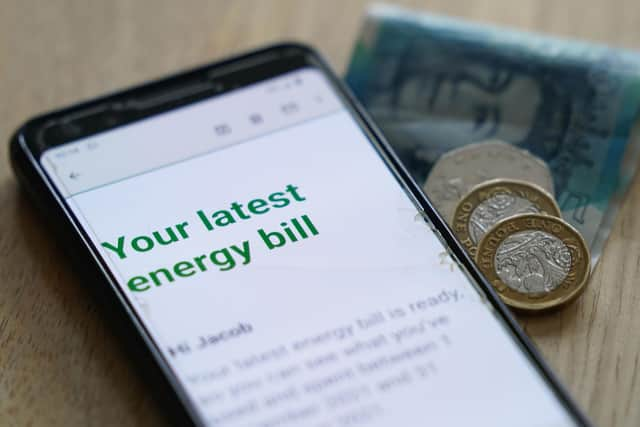Energy Price Rise: Expert from University of Sheffield explains the price rise and how you can lower your bill
and live on Freeview channel 276
Britain’s independent energy regulator, Ofgem, today announced a huge rise in the energy price cap of 54 per cent from April 1. This may see the average bill increase to as much as £1,915, causing huge worry for many people about who they will be able to afford the cost.
Dr Robert Marchand, director of undergraduate education at the University of Sheffield, and founder of the Fuel Poverty Research Network, explained the reasons for the rise and offered tips on how you can lower your energy bill.


Why are energy prices rising so much?
"Essentially, I think there’s two sides to this coin.
Advertisement
Hide AdAdvertisement
Hide Ad"One is the fact that the UK imports a lot of gas, and we don’t just use that to heat our homes, we also use that to make other electricity. We have a lot of gas powered turbines in our power stations.
"We have had a big rebound from the pandemic for the economy which is good, but that’s increased demand for gas so that has meant that the prices have gone up. There’s also been problems in gas production and there is a suggestion as well that perhaps Russia is potentially not putting as much to its interconnects to Europe as it could.


"Then there is the other side of the coin that we’re just not that good at investing in energy efficiency in the UK.
"Look at Sheffield, Barnsley, Rotherham, all around us there are a lot of terraced housing built in the early 1900s and its not very energy efficient – it has got gaps in the walls, the windows don’t fit well, some of them can’t even be insulated with cavity wall insulation because they’re solid wall and so that means we have to put a lot of energy into them to make them warm, so if our governments had actually committed to energy efficiency and helping people to insulate their homes and use less energy, perhaps we wouldn’t be feeling the pinch quite as much.”
Advertisement
Hide AdAdvertisement
Hide AdWhat will the impact be on the typical Sheffield household?“It was announced that it will, on the average bill, add £693 to the price cap as of April and people predict it could be going up again in six months time as well.
"We could be looking at £1,000 or more on the bills by the end of this year, so it’s going to be a real big pinch. When you’ve got interest rates potentially rising, inflation and general cost of living, it is going to be a real tight squeeze for everybody really to cope.”
What can people do to lower their bills?
“A lot of it is to do with simple things you can do to be more effective in your house. Some of them may include changes in your behaviour and doing things you may not want to do, but will make the bills more accessible.
"The first thing is using your curtains – so actually keep them open in the day and let the sunlight come in and, it won’t be huge amounts, but it will help warm the house. When it gets dark, close those curtains to help keep the heat in.
Advertisement
Hide AdAdvertisement
Hide Ad"If you can, use a timer on your central heating so that you are not trying to warm all the time.
"Also simple things like thinking about where your furniture is compared to your radiators. Try not to put your clothes to dry on the radiator as they’ll suck out the heat, but similarly, don’t put your sofa right up against the radiator, leave a little gap to allow that heat to move.
"Think about the temperature you have set your heating to. People like to be warm and toasty, but do you need to have your room set to 23 or 22 degrees. Anywhere between 18 to 21 degrees is healthy but every degree you lose off of your temperature will save around 10 per cent of your heating bill.
"Also just closing the doors in the house so the heat is kept in the places that it needs and you can also get reflector panels to go behind radiators.”
Advertisement
Hide AdAdvertisement
Hide AdRobert has created an article with The Conversation with more tips and tricks to keep your energy bill down: https://theconversation.com/10-ways-to-keep-your-house-warm-and-save-money-this-winter-67285
What are the rebate plans to help people and how will they work?
Rishi Sunak is set to announce £9 billion package of loans and council tax rebates in the aim of easing the cost of the energy prices on people. £5.5 billion in loans will fund £200 energy rebates for all and £3.5 billion council tax rebate for people in bands A-D with an average of £150, which will go to four in five households – approximately 21 million households.
On how the rebate plans may work, Dr Robert Marchand says: “I’ll be surprised if they sent everyone a £200 cheque. It will probably be administered by the energy companies to offset that increase on the bill, so you’ll see ‘s’ on the bill rather than being given the money.”
Will prices go back down?
Advertisement
Hide AdAdvertisement
Hide Ad"The suggestion is not immediately. Most major energy companies don’t buy their energy day by day but hedge it into the future.
"There was a 125 per cent increase in the forward price on gas between February and November last year, and whilst we’ve seen the daily price is very volatile, it is still a lot higher than it was this time last year, and as I say with the Ukraine situation and the fact a fire has burnt out one of our electricity interconnects between here and France, it seems there’s going to be at least a couple more years of volatility there.”

